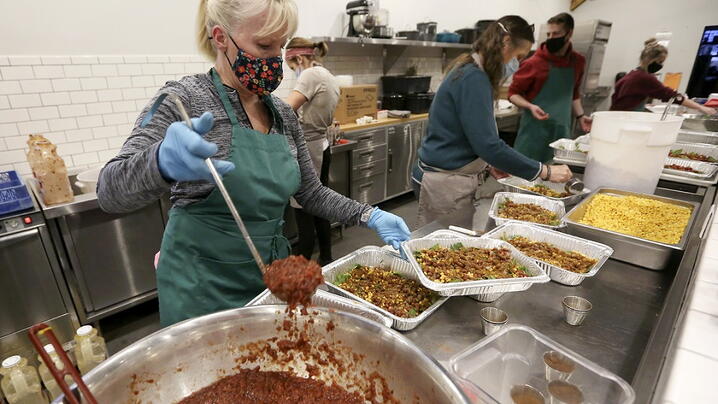
Even as Congress and the White House negotiate a stimulus package to address the ongoing public health and economic recovery challenges, cities and counties see the clock ticking down to December 30 to spend their remaining CARES Act funds.
In a letter to Congressional leaders, ICMA Executive Director Marc Ott urged prompt action to provide local governments direct, flexible funding. He provided examples of the innovative ways that local governments across the country have used CARES Act funds to address pressing needs:
Food and financial assistance
In Dubuque, Iowa, for example, the number of individuals needing food assistance grew from 8,500 pre-pandemic to 13,455 in October. Thanks to CARES Act funding, city leaders were able to support a struggling nonprofit business that in turn provided free healthy meals to approximately 2,210 low-and moderate-income community members in just the first six weeks.
A single mother of four children, who was working at a nursing home when the pandemic began, contracted COVID-19 and was sent home. During the time of her recovery, schools and daycares were closed. She was unable to return to work because she had to care for her children. She received a total of $2,710 in short-term financial assistance, allowing her to avoid eviction and having her utilities disconnected. Dubuque made the payments directly to her landlord and to the utility company.
Support to small businesses
Clear Creek County, Colorado, was ranked the 13th most economically impacted county in the country by USA Today due to its reliance on seasonal tourism but did not receive direct CARES Act funding because of its small population. With an allocation from the state of Colorado, the county was able to provide grants ranging from $5,000 to $20,000 to small, owner-operated businesses that contribute to the local economy. Library staff provided technical assistance to the small business to help them comply with the CARES Act reporting requirements.
Virtual school helps parents stay on the job
As the ongoing COVID-19 pandemic caused schools to shift to virtual or hybrid education, essential workers could not stay home to care for their young children or supervise their child’s distance learning. Mankato, Minnesota, worked with its nonprofit partners, including the Mayo Clinic Health System and the YMCA, to identify ways to leverage their assets and experience to support their essential workers.
The local YMCA has appropriate space to provide learning pods for virtual K-6 school support and substantial experience working with the school district on after-school programs, but was facing significant financial pressures due to the cancellation of in-person programs. Mankato provided a $20,000 CARES Act sustaining grant to the YMCA to offer learning pods staffed by aides who help children with virtual school support during distance learning phases.
Mankato also is piloting a virtual tutoring program for students in grades 6-12 and is making an online tutoring service available to its employees as well.
COVID Corps youth give back to their community
As summer jobs evaporated for young people in the aftermath of the COVID-19 pandemic, Montgomery County, Maryland, established a COVID Corps employment program for youth aged 16-23 years old. They were paid $14 an hour and worked at COVID-19 testing centers, swimming pools, and as transit ambassadors.
Groundbreaking Response and Recovery
Due to its population, Adams County, Colorado, has been a direct recipient of CARES Act funding, receiving $90 million. Within five days of receipt, 45% of the allocated funds were distributed to municipalities that were ineligible to receive their own direct funding. Of the $48 million the country retained, $22 million was allocated to the local school districts, $1 million to local fire districts, and $3 million to the public health department for contract tracing and investigation. The remainder of the funds were allocated to the county’s response and recovery needs.
The county also supported local business with $3 million awarded to restaurants, and $25,000 in bridge loans were provided to small businesses that were applying for SBA loans, carrying them through until the SBA funding was received. This program allowed for the retention and creation of 842 jobs.
New, Reduced Membership Dues
A new, reduced dues rate is available for CAOs/ACAOs, along with additional discounts for those in smaller communities, has been implemented. Learn more and be sure to join or renew today!
